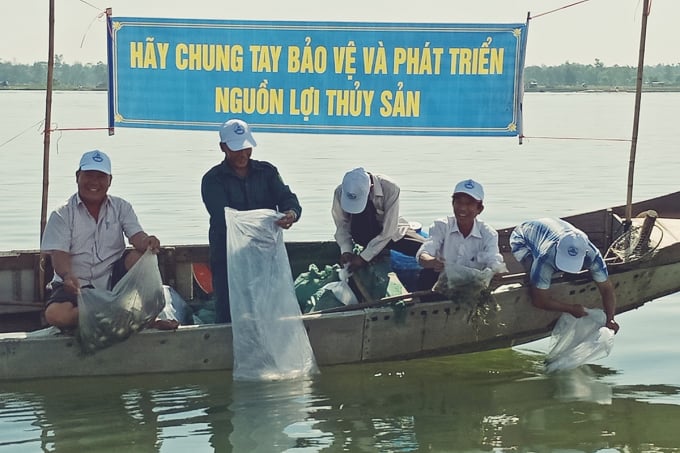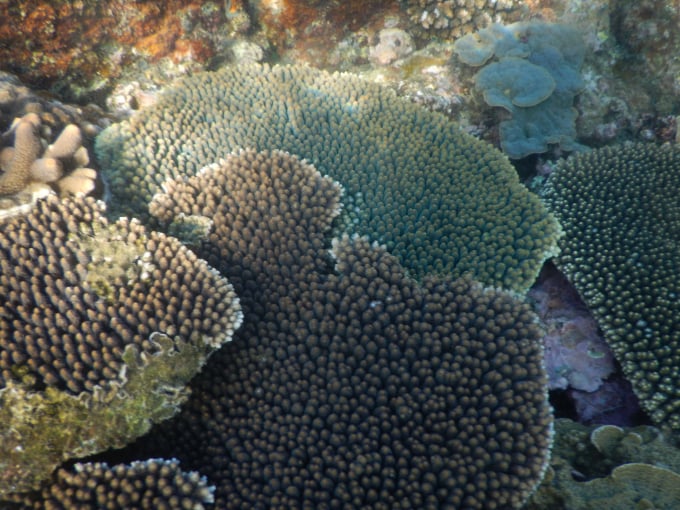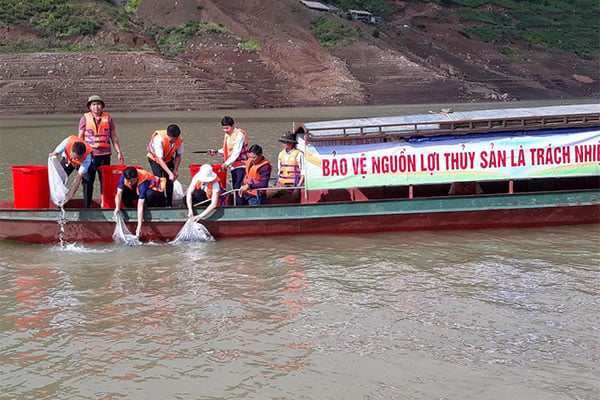November 28, 2025 | 04:16 GMT +7
November 28, 2025 | 04:16 GMT +7
Hotline: 0913.378.918
November 28, 2025 | 04:16 GMT +7
Hotline: 0913.378.918

The National Program on Aquatic Resources Protection and Reproduction toward 2030 will help preserve, restore and reproduce aquatic resources associated with effective management of aquatic exploitation. Photo: TL.
Under the program marine protected areas (MPAs) approved and planned for the 2021-2030 period with a vision to 2050 will be established and put into operation by 2025. Accordingly the total marine protected area will cover over 0.4% of Vietnam sea areas, contributing to achieving the goal of increasing coastal protected areas as specified in Resolution No.36-NQ/TW dated October 22, 2018 of the Central Committee. In addition, aquatic stocks will be maintained at the rate equivalent to the survey of aquatic resources in the 2016-2020 period and 30% of degraded marine ecosystem of the protected areas will be restored.
According to the draft program, the aquatic resources co-management will be implemented in 11 provinces and cities, equivalent to 5% of aquatic species listed as endangered, specious and rare species that are artificially reproduced and successfully reared in water bodies. The national database of aquatic resources will be improved and consistently updated.

Marine ecosystems especially coral reefs need to be restored urgently. Photo: TL.
By 2030, the investigation and assessment of aquatic resources and the habitats of aquatic species will be fully and continuously conducted. Information and data on aquatic resources will be digitized and updated into the national fishery database. Fish stocks will recover at least 5% from the figures in the survey in the 2016-2020 period.
The goals drafted by the General Directorate of Fisheries are restoring 70% of depleted sea ecosystems in the marine protected areas and implementing co-management in the protection of aquatic resources in at least 32 provinces and cities.
10% of aquatic species in the list of endangered, precious and rare species will be artificially reproduced and successfully reared in water bodies. The database on aquatic resources will be synchronously and effectively upgraded, integrated and connected between central and local management agencies.
With the goals set, the draft program will focus on investigating, assessing aquatic resources and aquatic habitats nationwide once every five years. The investigation and assessment of aquatic resources in the deep-sea and underground hilly areas is another focus.
Besides, the program will attach importance to the development of component database on aquatic resources in the national system of aquatic species and continuously updating information and publishing the results of surveys on aquatic species and habitats.

Releasing fish stocks to reproduce aquatic resources on hydropower reservoirs. Photo: TL.
In addition, the established marine protected areas will be consolidated and the newly-established marine protected areas will be put into operation as approved by the Prime Minister under the master plan on aquatic resources protection and exploitation in the 2021-2030 period with a vision to 2050.
Along with that, coral reefs, seagrass beds and mangrove forests in the marine protected areas and the sea beyond the protected areas suitable for the plan on aquatic protection and exploitation will be restored.
The policies on creating sustainable livelihoods for the communities in and around the marine protected areas will be developed. Furthermore, the marine environment and biodiversity will also be closely observed and monitored in the established marine protected areas.

According to the draft program, the protection and reproduction of aquatic resources need to be connected with ecotourism. Photo: TL.
At the same time, the development and protection of aquatic resources in combination with ecotourism, rural tourism will be paid attention. Especially priority will be given to the areas where previously received assistance from domestic and foreign organizations to implement the pilot models of aquatic resources co-management.
According to the draft program, fishing activities will be restructured to become more sustainable. Overexploitation along with environmentally unfriendly fishing measures will be gradually eliminated.
Translated by Mai Tham

(VAN) After the institutional merger, Da Nang possesses significant forest-carbon reserves and is proactively engaging in the carbon market, creating a new revenue stream.

(VAN) An Giang strengthens communication against IUU fishing, increases inspections and sanctions, and is determined to remove the EC’s “yellow card” while developing a sustainable fisheries sector.

(VAN) As green transition becomes a global trajectory, Viet Nam’s biggest challenge is not only technology and models, but how to ensure that capital flows reach the right beneficiaries.

(VAN) The Ministry of Agriculture and Environment must spearhead the construction of green governance, spanning decision-making processes and investment standards to policy evaluation mechanisms.

(VAN) The Agriculture and Environment sector of Khanh Hoa has achieved numerous milestones over the past 80 years, contributing significantly to the goal of establishing the province as a centrally governed city by 2030.

(VAN) Viet Nam is entering the pivotal period of 2025-2030, moving toward the formulation of the Remote Sensing Law, which will establish a legal foundation for the development of national digital data.

(VAN) The agricultural sector is finalizing the strategic framework for emission reduction, setting the goal of sharply cutting methane and 403.7 million tons of CO2 equivalent and moving toward Net Zero by 2050.